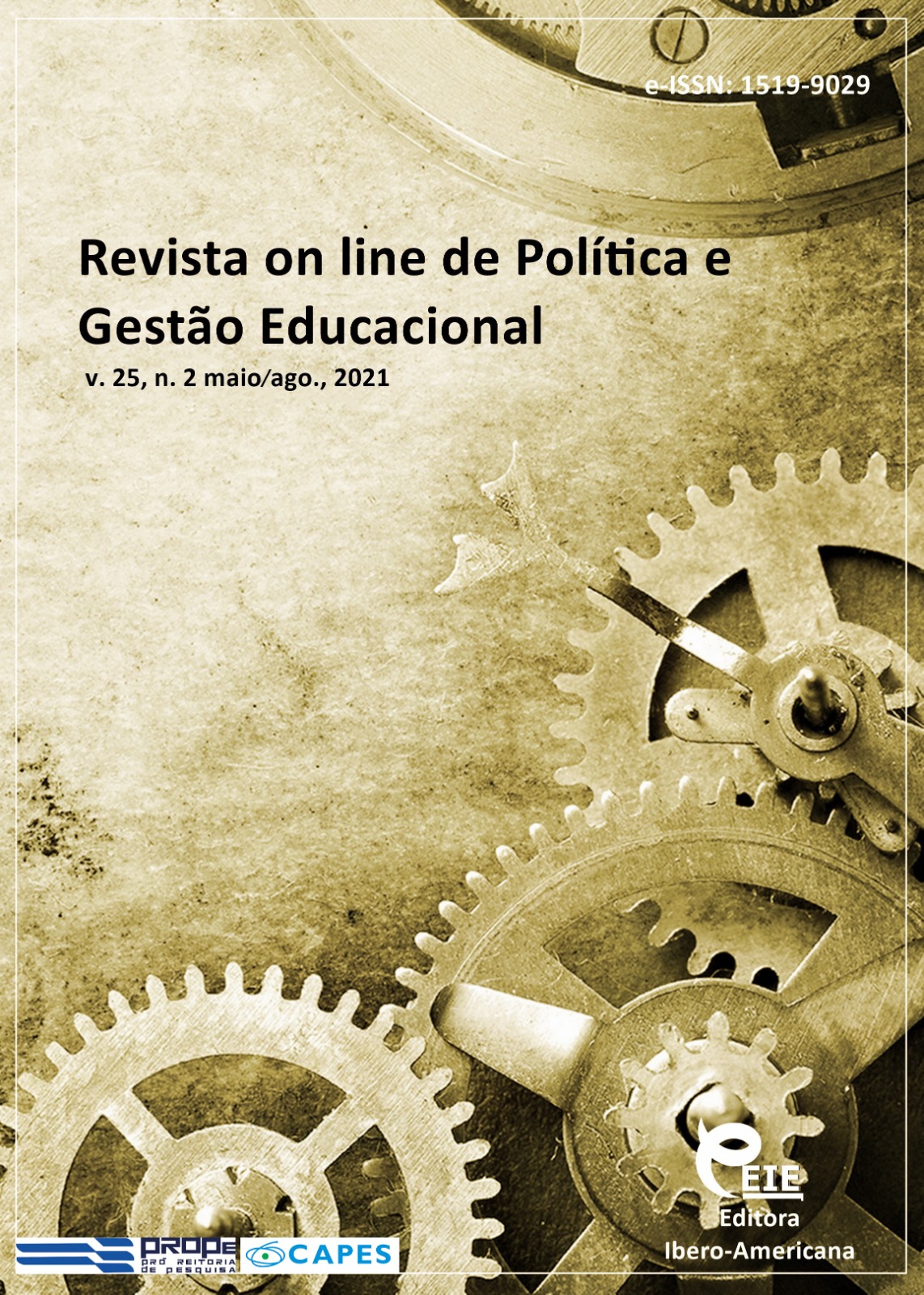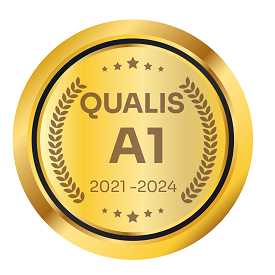Desarrollo del aprendizaje en línea en las universidades de Yakutia durante la pandemia de COVID-19
DOI:
https://doi.org/10.22633/rpge.v25i2.15314Palabras clave:
Formación a distancia, E-learning, Competencia del sujeto, Educación regional, PandemiasResumen
El manuscrito presenta la organización de la educación a distancia en línea para los estudiantes de las tres universidades por medio de tecnologías educativas digitales en el período de cuarentena mundial debido a la COVID-19. El propósito del estudio es aumentar el nivel de competencia de las asignaturas entre los estudiantes en el contexto de la organización de la educación a distancia en línea durante una pandemia, teniendo en cuenta las especificidades de la educación regional. En el estudio se utilizó el método de la encuesta teniendo en cuenta las especificidades de la organización de la enseñanza en línea en el sistema educativo regional con el tratamiento estadístico de los datos de los resultados de la investigación. Los resultados permitieron aumentar la eficiencia del trabajo con los estudiantes en la realización de clases en las disciplinas del bloque de información durante una pandemia utilizando la plataforma Moodle, lo que indica razonablemente la necesidad de considerar las peculiaridades del entorno educativo en el desarrollo de la competencia de la materia entre los estudiantes de tres universidades de la República de Saja (Yakutia).
Descargas
Citas
ALMPANIS, T. using a mixed methods research design in a study investigating the ‘heads of e learning’ perspective towards technology enhanced learning. Ejel, v. 14, n. 5, p. 301-311, 2016.
BARAKHSANOV, V. P.; DANILOVA, A. I. Organization of the educational process through new information technologies in conditions of self-isolation. Problems of Modern Pedagogical Education, n. 68-1, p. 17-20, 2020.
BARAKHSANOVA, E. A. et al. Transdisciplinary approach to training future managers for digital education in Yakutia. Propositos y Representaciones, v. 8, n. 3, p. е702, 2020.
BELITSKI, M.; HERON, K. Expanding entrepreneurship education ecosystems. Journal of Management Development, v. 2, n. 36, p. 163-177, 2017.
BULANKINA, N. et al. Axiological component of professional readiness of a modern teacher to work in the aspect of the cross-border region. Trends in the Development of Psycho-Pedagogical Education in the Conditions of Transitional Society (ICTDPP-2019), v. 70, 2019. DOI: doi.org/10.1051/shsconf/20197002002
HATZIPANAGOS, S.; GREGSON, J. The role of open access and open educational resources: a distance learning perspective. Ejel, v. 13, n. 2, p. 97-105, 2015.
ITZKOWITZ, H. The Triple Helix: University-Industry-Government Innovation in Action. New York, US: Routledge, 2008.
ITZKOWITZ, H.; LEYDESDORFF, L. The Triple Helix: University-Industry-Government Relations: A Laboratory for Knowledge-Based Economic Development. EASST Review, v. 14, n. 1, p. 14-19, 1995.
KARANATOVA, L. G.; KULEV, A. Transformation of the ecosystem of additional professional education under the influence of innovative technologies. Management Consulting, n. 12, p. 120-129, 2020.
KOSTIKOVA, N. A. et al. The didactic potential of university electronic information and educational environment in the context of a pandemic. Propósitos y Representaciones, v. 8, n. 3, e707, 2020. DOI: dx.doi.org/10.20511/pyr2020.v8nSPE2.707
LAPCHIK, M. P. Training of pedagogical personnel in the conditions of informatization of education. Moscow, Russia: BINOM Knowledge laboratory, 2013.
NEUSTROEV, N. D.; NEUSTROEVA, A. N. Ethnocultural education of future teachers for schools of indigenous peoples of the North. Yakutsk, Russia: Media-holding “Yakutia”, 2015.
OLESOV, N. P. The problem of education based on ethnocultural values in the context of globalization processes. Modern Pedagogical Education, n. 3, p. 17-19, 2020.
OLSSON, M. MOZELIUS, P.; COLLIN, J. Visualisation and gamification of e-learning and programming education. Ejel, v. 13, n. 6, 2015. p. 452-465.
OSIPOVA, S. I.; PRIKHODKA, O. V.; BOGDANOVA, A. I. Speech culture in preserving the national identity of the individual. Perspectives of Science and Education, n. 6, p. 78-90, 2019.
PRATIWI, W. R. The practice of digital learning (D-Learning) in the study from home (SFH) policy: teachers' perceptions. Journal of Southwest Jiaotong University, v. 55, n. 4, 2020. DOI: 10.35741/issn.0258-2724.55.4.17
PROKOPIEV, M. S. et al. Development of a programming course for students of a teacher training higher education institution using the programming language Python. Propositos y Representaciones, v. 8, n. 3, e484, 2020.
PROKOPIEV, M. S. Formation of information and communication competence among students of a pedagogical institute. Bulletin d'EUROTALENT-FIDJIP, n. 4, p. 37-40, 2013.
REICHERT, S. The role of universities in regional innovation ecosystems. US: Brussels, Belgium, 2019.
SOLOVIEVA, R. A. et al. The internet and prospective engineers: results analysis for studies conducted during the pandemic. Propositos y Representaciones, v. 8, n. 3, 2020.
TRETYAKOVA, T. V. et al. Digital education as a new vector of development of education in the northern regions. In: ANIKINA, Z. (Ed.). Integrating engineering education and humanities for global intercultural perspectives. Springer Nature, 2020. v. 131, р. 864-870.
TRETYAKOVA, T. V. The concept of development of teacher education at the North-Eastern Federal University. Yakutsk, Russia: LLC Company “Dani-Almas”, 2019.
VARLAMOVA V. A. Bilingual educational environment in pedagogical research. The Azimuth of Scientific Research: Pedagogy and Psychology, v. 7, n. 4, p. 56-58, 2018.
VARLAMOVA V. A.; BARAKHSANOVA E. A. Formation of information competence of future teachers in a bilingual environment. In: International Scientific and Educational Forum “Education, forward!” Forum materials. 2015. p. 102-105.
VLASOVA, E. Z. et al. Teacher education in higher education systems during the pandemic and the synergy of digital technology. Propositos y Representaciones, v. 8, n. 3, e719, 2020.
VLASOVA, E. Z.; BARAKHSANOVA, E. A. Innovative solutions for training teachers for the regions of the North for the use of e-learning. Letters to Emission. Offline. 2019. n. 9, p. 2762.
VOLKOVA, I. O.; YAKOVLEVA, A. Diagnostics of the conditions for the development of innovative ecosystems in the energy sector. Innovative Economics, v. 10, n. 228, p. 52-60, 2017.
YAKUSHKINA, M. S.; ILAKAVICHUS, M. R.; ZHIRKOVA, Z. S. Intercultural enlightenment dialogue in the context of the internet and event-based interactions in the cis countries. In: THE ANNUAL INTERNATIONAL CONFERENCE ON COGNITIVE - SOCIAL, AND BEHAVIOURAL SCIENCES, 7., 2018, Moscow. Proceedings […]. Moscow, Russia, 2019. p. 204-216. DOI: doi.org/10.15405/epsbs.2019.02.02.24
ZHIRKOVA Z. S. A model for managing innovation in rural schools in the Arctic. Education and Science. Bulletin of the Ural Branch of the Russian Academy of Science, v. 5, n. 73, p. 92-108, 2010.
Publicado
Cómo citar
Número
Sección
Licencia
Derechos de autor 2021 Revista on line de Política e Gestão Educacional

Esta obra está bajo una licencia internacional Creative Commons Atribución-NoComercial-CompartirIgual 4.0.
Manuscritos aceitos e publicados são de propriedade da Revista on line de Política e Gestão Educacional. É vedada a submissão integral ou parcial do manuscrito a qualquer outro periódico. A responsabilidade do conteúdo dos artigos é exclusiva dos autores. É vedada a tradução para outro idioma sem a autorização escrita do Editor ouvida a Comissão Editorial Científica.











